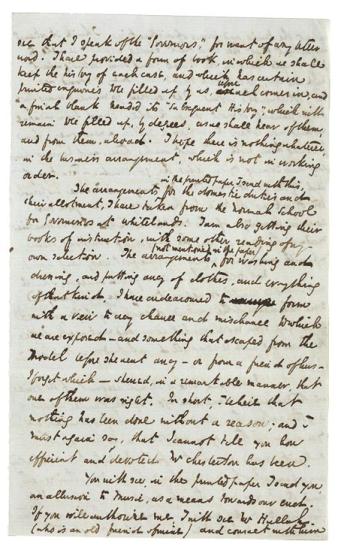Letter 3 | 3 November 1847 | to Angela Burdett-Coutts, page 11

Autograph letter signed, London, 3 November 1847, to Angela Burdett-Coutts
Purchased with the assistance of the Fellows, 1951
Dickens's letters to Burdett-Coutts are, by any standard, extremely long and detailed and reveal his extraordinarily competent administrative abilities as well as shrewd insight into the minds and motivations of the women who would enter Urania Cottage. He insisted "that their past lives should never be referred to." He also recognized "that these unfortunate creatures are to be tempted to virtue. They cannot be dragged, driven, or frightened." Dickens's meticulous attention to detail is apparent in this letter, in which he informs Burdett-Coutts that "I have laid in all the dresses and linen of every sort for the whole house... I have made them as cheerful in appearance as they reasonably could be—at the same time very neat and modest."
Philanthropy
From 1840 Dickens guided the charitable work of philanthropist Angela Burdett-Coutts (1814–1906), the wealthiest heiress in Victorian Britain. Dickens served as her official almoner and helped to assess the merits of the thousands of letters she received from those seeking financial assistance. He also advised on her plan for improved sanitation in the slums of Westminster and drew her attention and support to the Ragged School Union, which provided education to London's poorest children. A pragmatist, Dickens encouraged Burdett-Coutts to direct her philanthropy toward the causes of distress. In 1847 they founded a home, Urania Cottage, in Shepherd's Bush, as a shelter for homeless women—prostitutes or petty criminals who sought to rehabilitate themselves by learning practical skills and developing self-discipline. Many of the women were assisted to eventually emigrate to one of Britain's colonies to begin a new life. For more than ten years, Dickens administered Urania Cottage on behalf of Burdett-Coutts and played an extremely active role in its day-to-day management.
see that I speak of the "Governors", for want of any better word. I have provided a form of book, in which we shall keep the history of each case, and which has certain printed enquiries to be filled up by us, before each comes in, and a final blank headed its "Subsequent History", which will remain to be filled up, by degrees, as we shall hear of them, and from them, abroad. I hope there is nothing whatever, in the business arrangement, which is not in working order.
The arrangements in the printed paper I send with this, for the domestic duties and their allotment, I have taken from the Normal School for Governesses at Whitelands. I am also getting their books of instruction, with some other reading of my own selection. The arrangements (not mentioned in the paper) for washing and dressing, and putting away of clothes, and everything of that kind, I have endeavoured to form with a view to every chance and mischance to which we are exposed—and something that escaped from the Model before she went away—or from a friend of hers—I forget which—shewed, in a remarkable manner, that one of them was right. In short, I believe that nothing has been done without a reason; and I must again say, that I cannot tell you how efficient and devoted Mr. Chesterton has been.
You will see, in the printed paper I send you, an allusion to Music, as a means towards our end. If you will authorize me, I will see Mr. Hullah (who is an old friend of mine) and consult with him